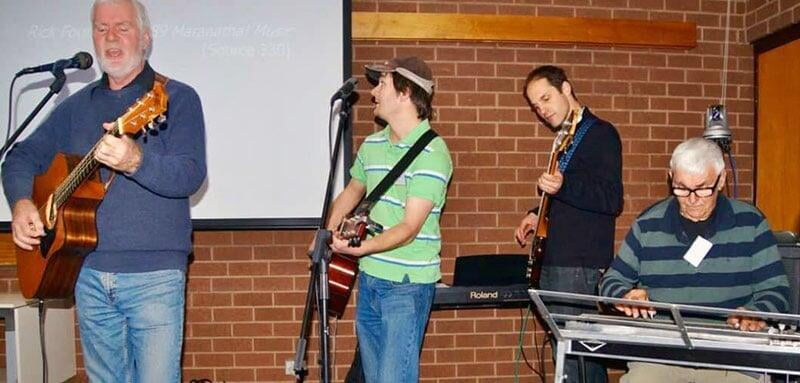Story by Ian Baker
At 65, John Lace was doing well. He had 35,000 citrus trees, on four properties, accumulated over 40 years at Barham, on the Murray River half way between Echuca and Swan Hill. He had two daughters, one of whom had joined him to help on the farm with her husband. And he was happily married to Barbara, whom he was supporting as she faced crippling arthritis. On Sundays he would go to church, where he would play the pedal steel guitar in a country band that backed the voices of the Barham-Koondrook Baptist congregation.
“The pedal steel is probably one of the hardest instruments you can play,” says John of the device credited with putting the twang into country music. “Both your legs are working – one’s on pedals, and one’s on the volume control. Both your knees are supposed to work with knee levers. And then both hands are working. Usually the left hand controls a steel slide, while three fingers of your right hand pluck the strings.”
On a January morning in 2006, John began work at seven with more than his playing to think about. Barbara’s arthritis had worsened, and his daughter and son-in-law were about to board a plane for an interstate holiday.
One missed step
“I had the pressure of looking after the whole operation on that day, so I probably had a lot on my mind,” he acknowledges. He had been unblocking an overhead sprinkler, using a long ladder that he had leant against a tree. He believes that, preoccupied, he missed a step as he began his 2.5 metre descent. “I landed head-first,” he reports. “It was sandy soil, and I left an imprint in the ground 20mm deep.”
The immediate result was widespread paralysis. John could move his head and his big toe, and when he moved his toe he felt pain in his back.
There wasn’t much he could do but lie there and breathe, which he did for the next half-dozen hours.
He says it occurred to him that for the rest of his life he may well need a wheelchair for mobility, and that he may need to have his car modified. It did not occur to him that he might not regain even the use of his arms. Nevertheless he understood that he might not retire on the farm with Barbara, as he had hoped to do, and that he and his wife might need to move into specialist accommodation where others could care for them.
About 2pm, Barbara and a friend found John and arranged an ambulance. He was diagnosed with a C2-3 level spinal cord injury. After three weeks at the Austin Health Spinal Injuries Unit at Heidelberg, he was discharged to the Royal Talbot Rehabilitation Centre at Kew. Three months later, at a planning meeting with health staff and family, he asked a question he had resisted: “Will I walk again?” Rehabilitation specialist Steve Hill said it looked like he would. After six months he was discharged to further rehabilitation at home with Barbara, able to walk with a stick and to feed himself sandwiches. How was that? “Well,” John says, “It felt pretty good.”
Well wishers
Barham is a small town of about 1100 people, a lot of whom seemed to know about John’s accident from a local newspaper article written by his pastor, Geoff Leslie, who also led the church band. Family, friends and members of the congregation had visited Melbourne so that they could help sustain Barbara, at a serviced apartment she had taken near Royal Talbot. When John came home, people he hadn’t spent time with for years would approach him in the street and wish him well.
At first support workers came in daily to help John and Barbara, and then after a while it was just to help Barbara. With nutrition support from Meals on Wheels, and some extra fittings that helped John climb into his tractor, the couple were able to spend another seven years on the farm. They retired to a riverside property in town for their final year together, before Barbara died from complications of her arthritis.
Hopes and fears
John says that even in early days after his diagnosis, he never felt intense fear for his prospects, or intense grief for what he had lost through his injury. He says his hope was buttressed by intimations even in those first weeks at the Austin that he would regain feeling and movement: for example, his legs could exert some pressure on the footplate of his bed. At Royal Talbot, within a month he could sustain a sitting position if he were placed in one. After about four months, he could mimic a walk if an assistant on either side supported most of his weight.
He was aware that of the 15 injured people at Royal Talbot with him, only two or three might recover as he was. He understood that many there were experiencing extreme distress, and he understood why. He felt for them, but he was not among them. “The fact that there was restoration taking place bit by bit continued to encourage me,” he recalls. “People said I exhibited a lot of determination.” Last year, he joined by telephone a Regional Network meeting hosted by AQA, and he appreciated the opportunity to connect with people – while recognising afresh that he had been spared much of what others faced daily.
In the limelight
About six months after he left Royal Talbot, John returned to his pedal steel and found he could just about play it. He could use the pedals but not the knee levers, and could control the slide with his left hand and just one pick with his right. Now 81, he still performs at church from time to time, contributing single-line leads and fills to gospel tracks played through his phone and a Bluetooth loudspeaker. For a recent joint service it was advertised that he would be performing.
“I usually just play before the church service starts,” he explains, “and entertain people for a quarter of an hour, 20 minutes, with a bit of background music.”
John remembers that at one of his first performances after he was discharged from Royal Talbot, a member of the congregation approached him. “She said, you know, ‘I felt very emotional about the fact that you were back playing the instrument again’,” he recalls.
“It was emotional for me. I became emotional, as well, when I first walked back into that church building. I don’t know why. I guess it was just the feeling that came over me. The fact that I was back home again.”
- April 19, 2021




